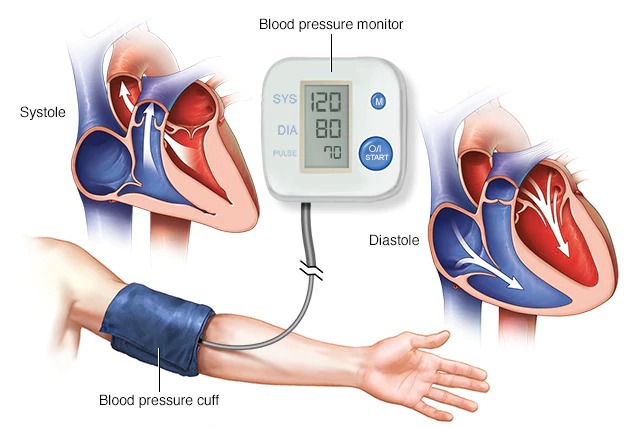Hypertension: What You Need to Know
Hypertension, or high blood pressure, is a common but serious condition that affects millions of people worldwide. It occurs when the force of blood pushing against the walls of your arteries is too high, putting extra strain on your heart and blood vessels. Over time, this can lead to various health problems, such as heart attack, stroke, kidney disease, and vision loss.
In this blog post, we will explain what hypertension is, what causes it, how to prevent it, and how to treat it. We will also answer some frequently asked questions about hypertension and provide some useful resources for more information.
What is hypertension?
Blood pressure is the measurement of the force of blood flowing through your blood vessels. It is usually expressed as two numbers: systolic and diastolic pressure. Systolic pressure is the pressure that your heart experiences while it beats and pumps blood. Diastolic pressure is the pressure in your heart while it is at rest between beats.
Normal blood pressure for adults is less than 120/80 mmHg (millimeters of mercury). Hypertension is defined as blood pressure that is consistently 130/80 mmHg or higher. There are different stages of hypertension depending on how high your blood pressure is:
• Stage 1 hypertension: 130-139/80-89 mmHg
• Stage 2 hypertension: 140/90 mmHg or higher
• Hypertensive crisis: 180/120 mmHg or higher (requires immediate medical attention)
It is possible to have hypertension for years without experiencing any symptoms. This does not, however, imply that it is risk-free. High blood pressure can damage your arteries, heart, brain, kidneys, eyes, and other organs without you noticing. That is why hypertension is often called a “silent killer”.
The only way to know if you have hypertension is to have your blood pressure checked regularly by a health professional. You can also use a home blood pressure monitor to keep track of your readings. However, you should not rely on home measurements alone. You should always consult your doctor for a proper diagnosis and treatment plan.
What causes hypertension?
Hypertension can be caused by a variety of circumstances. Some of them are modifiable, meaning you can change them by adopting a healthier lifestyle. Others are non-modifiable, meaning you cannot change them but you can manage them with medication or other interventions.
Some of the modifiable risk factors for hypertension are:
• Unhealthy diet: Eating too much salt, saturated fat, trans fat, sugar, and processed foods can raise your blood pressure. On the other hand, eating more fruits, vegetables, whole grains, lean protein, and healthy fats can lower your blood pressure.
• Physical inactivity: Being sedentary can increase your risk of hypertension. Regular physical activity can help lower your blood pressure by strengthening your heart and improving your blood circulation.
• Excess weight: Being overweight or obese can put extra pressure on your heart and blood vessels. Losing weight can help lower your blood pressure and reduce your risk of other health problems.
• Tobacco use: Smoking or chewing tobacco can damage your blood vessels and increase your blood pressure. Quitting tobacco can help lower your blood pressure and improve your overall health.
• Alcohol use: Drinking too much alcohol can raise your blood pressure and harm your liver and other organs. Limiting alcohol intake can help lower your blood pressure and prevent other complications.
Some of the non-modifiable risk factors for hypertension are:
• Age: As you get older, your blood vessels tend to become stiffer and narrower, which can increase your blood pressure. However, this does not mean that hypertension is inevitable with age. You can still prevent or control it by following a healthy lifestyle and taking medication if needed.
• Family history: If you have a close relative who has hypertension, you may have a higher risk of developing it yourself. However, this does not mean that you will definitely get it. You can still lower your risk by avoiding the modifiable risk factors.
• Race/ethnicity: Some racial/ethnic groups have a higher prevalence of hypertension than others. For example, African Americans tend to have higher rates of hypertension than Caucasians or Asians. This may be due to genetic factors as well as environmental and social factors.
• Other medical conditions: Some medical conditions can cause or worsen hypertension. For example, diabetes, kidney disease, thyroid disease, sleep apnea, and pregnancy can affect your blood pressure levels. If you have any of these conditions, you should work with your doctor to manage them and monitor your blood pressure.
How to prevent hypertension?
The best way to prevent hypertension is to adopt a healthy lifestyle that addresses the modifiable risk factors mentioned above. Here are some tips to help you prevent or delay the onset of hypertension:
• Eat a balanced diet that is low in salt, saturated fat, trans fat, sugar, and processed foods. Make an effort to consume at least five servings of fruits and vegetables every day. Choose whole grains over refined grains. Include lean protein sources such as fish, poultry, beans, nuts, and seeds in your meals. Use healthy oils such as olive oil or canola oil for cooking and dressing.
• Limit your daily alcohol consumption to one drink for women and two drinks for men. One drink equals 12 ounces of beer, 5 ounces of wine, or 1.5 ounces of liquor.
• Avoid tobacco use in any form. Quit smoking or chewing tobacco as soon as possible. Consult your doctor if you need help.
• On most days of the week, engage in physical activity for at least 30 minutes. You can do moderate-intensity activities such as brisk walking, cycling, or swimming, or vigorous-intensity activities such as jogging, running, or aerobics. You can also do strength training exercises such as lifting weights, doing push-ups, or using resistance bands twice a week.
• Maintain a weight that is appropriate for your height and body type. can calculate your body mass index (BMI) using this formula: BMI = weight in kilograms / (height in meters)2 A normal BMI range is between 18.5 and 24.9 kg/m2. If you are overweight or obese, try to lose weight gradually by reducing your calorie intake and increasing your physical activity. Aim for losing about one to two pounds per week until you reach your goal weight.
• Manage stress in healthy ways such as practicing relaxation techniques, meditating, doing yoga, listening to music, reading, or spending time with friends and family. Avoid coping with stress by overeating, drinking alcohol, smoking, or using drugs. These habits can worsen your blood pressure and harm your health in other ways.
• Check your blood pressure regularly at home or at a clinic. Keep track of your readings and give them to your doctor. If you notice any changes or abnormalities in your blood pressure levels, consult your doctor right away.
How to treat hypertension?
If you have been diagnosed with hypertension by a doctor, you should follow his or her advice on how to treat it. Depending on how high your blood pressure is and whether you have any other medical conditions or risk factors, your doctor may prescribe one or more medications to lower your blood pressure and protect your organs from damage.
There are many types of medications available for treating hypertension, such as diuretics, beta blockers, calcium channel blockers, angiotensin-converting enzyme (ACE) inhibitors, angiotensin II receptor blockers (ARBs), and others. Each medication has its own benefits and side effects, so you should discuss with your doctor which one is best for you. You should take your medication exactly as prescribed by your doctor and do not stop taking it without his or her approval. You should also inform your doctor about any other medications, supplements, or herbal remedies that you are taking to avoid any potential interactions or complications. In addition to taking medication, you should also continue to follow a healthy lifestyle that includes eating well, being active, quitting tobacco, limiting alcohol, managing stress, and checking your blood pressure regularly. By doing so, you can lower your blood pressure effectively and reduce your risk of complications such as heart attack, stroke, kidney disease, and vision loss. Frequently asked questions about hypertension. Here are some common questions that people may have about hypertension:
Q: What are the signs and symptoms of high blood pressure?
A: Most people with high blood pressure do not have any symptoms until their condition becomes severe or life-threatening. However, some people may experience headaches, dizziness, shortness of breath, chest pain, nausea, vomiting, blurred vision, anxiety, confusion, buzzing in the ears, nosebleeds, or abnormal heart rhythm if their blood pressure is very high (180/120 mmHg or higher). If you have any of these symptoms along with high blood pressure, seek emergency medical help immediately.
Q: What are the complications of high blood pressure?
A: High blood pressure can damage various organs in the body over time, such as the heart, brain, kidneys, eyes, and arteries. This can lead to serious health problems such as:
• Heart attack: A blockage in one or more coronary arteries that supply oxygen-rich blood to the heart muscle, causing chest pain, shortness of breath, sweating, nausea, or fainting.
• Stroke: A blockage or rupture in one or more
• blood vessels in the brain that supply oxygen-rich blood to the brain cells, causing sudden weakness, numbness, slurred speech, vision problems, confusion, or loss of consciousness.
• Kidney disease: A loss of kidney function due to damage to the blood vessels or filters in the kidneys, causing swelling, fatigue, nausea, itching, or difficulty urinating.
• Vision loss: Damage to the blood vessels or nerves in the eyes, causing blurred vision, floaters, flashes, or blindness.
• Arterial disease: A narrowing or hardening of the arteries that supply blood to various parts of the body, causing pain, cramping, coldness, numbness, or ulcers in the legs or feet.
Q: How can I lower my blood pressure naturally?
A: There are many lifestyle changes that can help lower your blood pressure naturally, such as:
• Eating a balanced diet that is low in salt, saturated fat, trans fat, sugar, and processed foods. Make an effort to consume at least five servings of fruits and vegetables every day. Choose whole grains over refined grains. Include lean protein sources such as fish, poultry, beans, nuts, and seeds in your meals. Use healthy oils such as olive oil or canola oil for cooking and dressing.
• Limit alcohol consumption to one drink per day for women and two drinks per day for males. One drink is equivalent to 12 oz. of beer, 5 oz. of wine, or 1.5 oz. of liquor.
• Avoid tobacco use in any form. Quit smoking or chewing tobacco as soon as possible. Consult your doctor if you need assistance.
• Exercising for at least 30 minutes on most days of the week. You can do moderate-intensity activities such as brisk walking, cycling, or swimming, or vigorous-intensity activities such as jogging, running, or aerobics. You can also do strength training exercises such as lifting weights, doing push-ups, or using resistance bands twice a week.
• Keeping a healthy weight that is proportionate to your height and body type. You can calculate your body mass index (BMI) using this formula: BMI = weight in kilograms / (height in meters)2 A normal BMI range is between 18.5 and 24.9 kg/m2. If you are overweight or obese, try to lose weight gradually by reducing your calorie intake and increasing your physical activity. Aim for losing about one to two pounds per week until you reach your goal weight.
• Managing stress in healthy ways such as practicing relaxation techniques, meditating, doing yoga, listening to music, reading, or spending time with friends and family. Avoid coping with stress by overeating, drinking alcohol, smoking, or using drugs. These habits can worsen your blood pressure and harm your health in other ways.
• Checking your blood pressure regularly at home or at a clinic. Keep track of your readings and give them to your doctor. If you notice any changes or abnormalities in your blood pressure levels, consult your doctor right away.
Q: What are some foods that can lower blood pressure?
A: Some foods that can lower blood pressure include:
• Potassium-rich foods: Potassium is a mineral that helps regulate the balance of fluids and electrolytes in the body. It also helps relax the blood vessels and lower blood pressure. Some potassium-rich foods are bananas, oranges, potatoes, tomatoes, spinach, beans, yogurt, and nuts.
• Calcium-rich foods: Calcium is a mineral that helps maintain strong bones and teeth. It also helps regulate muscle contraction and nerve function. Some calcium-rich foods are milk, cheese, yogurt, broccoli, kale, tofu, almonds, and fortified cereals.
• Magnesium-rich foods: Magnesium is a mineral that helps regulate many biochemical reactions in the body. It also aids in the dilation of blood vessels and the reduction of blood pressure. Dark chocolate, avocados, almonds, and seeds are among magnesium-rich meals.
• Seeds, legumes, whole grains, and leafy greens are all good sources of iron.
• Omega-3 fatty acids: Omega-3 fatty acids are a type of healthy fat that helps reduce inflammation and lower blood pressure. They also aid in the reduction of triglycerides and the increase of HDL (good) cholesterol. Some omega-3 rich foods are fatty fish such as salmon, tuna, mackerel, sardines, and herring, as well as flaxseeds, chia seeds, walnuts, and soybeans.
• Garlic: Garlic is a herb that has many health benefits. It contains a compound called allicin that helps lower blood pressure by relaxing the blood vessels and preventing platelet aggregation. You can eat raw or cooked garlic, or take garlic supplements as directed by your doctor.
• Berries: Berries are fruits that are rich in antioxidants, flavonoids, and polyphenols. These compounds help protect the blood vessels from oxidative damage and inflammation. They also help lower blood pressure by improving the function of the endothelium, the inner lining of the blood vessels. Some berries that can lower blood pressure are blueberries, strawberries, raspberries, blackberries, and cranberries.
Q: What are some natural remedies for high blood pressure?
A: Some natural remedies that may help lower blood pressure include:
• Hibiscus tea: Hibiscus tea is a herbal tea made from the dried flowers of the hibiscus plant. It has a tart flavor and a red color. It contains antioxidants and anthocyanins that help lower blood pressure by inhibiting the enzyme that constricts the blood vessels. You can drink hibiscus tea hot or cold, or add some honey or lemon for extra flavor.
• Coenzyme Q10: Coenzyme Q10 (CoQ10) is a substance that is naturally produced by the body and is involved in energy production and cellular function. It also acts as an antioxidant and protects the blood vessels from oxidative stress. Some studies have shown that taking CoQ10 supplements can lower blood pressure in people with hypertension. More study, however, is required to validate its efficacy and safety. You should consult your doctor before taking CoQ10 supplements, especially if you are taking any other medications.
• Beetroot juice: Beetroot juice is a vegetable juice that is rich in nitrates, which are converted into nitric oxide in the body. Nitric oxide is a molecule that helps relax and widen the blood vessels, thus lowering blood pressure. You can drink beetroot juice alone or mix it with other juices such as apple, carrot, or celery. You can also eat raw or cooked beets as part of your diet.
• Lavender oil: Lavender oil is an essential oil that has a soothing and calming effect on the mind and body. It can help lower blood pressure by reducing stress, anxiety, and depression. You can inhale lavender oil using a diffuser or a spray bottle, or apply it topically on your temples, wrists, or chest after diluting it with a carrier oil such as almond or coconut oil. You can also add a few drops of lavender oil to your bath water or pillow for a relaxing sleep.
Conclusion
Hypertension is a common but serious condition that can lead to various health complications if left untreated. The good news is that you can prevent and treat hypertension by following a healthy lifestyle and taking medication if needed. By doing so, you can lower your blood pressure and improve your quality of life.
We hope this blog post has given you some useful information about hypertension and how to manage it. If you have any questions or concerns about your blood pressure or your health in general, please consult your doctor or a qualified health professional.
Thank you for reading this blog post and stay tuned for more health-related topics.



